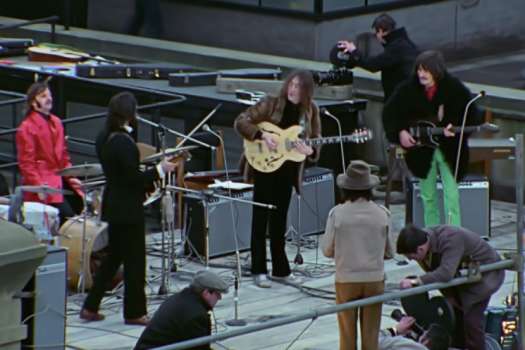Ken Loach is a master of presenting the struggles of the world in the lives of a few. Politics, class struggle intertwined with love and happiness described on a personal level. There is no point in hiding my bias for Ken Loach films. His mix of intellect and emotion is unparalleled and I'm a sucker for a good Marxist kitchen sink drama. (And there's something wonderful about hearing a thick Yorkshire accent "Sardines on toast with pickle, fucking lovely!" and their habit of dropping the article, definite or not "Let's get on floor.") "The Navigators" is not one of Loach's best but its depiction of the effects of privatization and destruction of the permanent workforce is both brutal and honest. It is painful to watch because we know it is true.
Loach films work best when he centres his story on one or two people. His characters are layered, complicated and quite often make some very questionable choices. The story lines rarely unfold as one expects and certainly not like the typical Hollywood fare. Any problems that arise generally do so when he spreads the story out among too many characters. These films, such as "The Navigators" and "Land and Freedom," often sacrifice in-depth portrayals of the characters for more political discourse. This is not to say that the people of "The Navigators" are two dimensional but we are not as involved in their lives as those who appear in "Raining Stones" or "Ladybird, Ladybird." Therefore, there is an added distance. And it means that there will almost certainly be a heated political discussion about their next move; different opinions and ideologies flying across the table. This is not a criticism. These scenes have a chaotic, spontaneous feel to them as a handheld camera spins around the room to catch each character's comments as tensions run high. It has the feel of improvisations. Every time the camera swings there's always a part of me that hopes it will cast out into the audience so I can add my thoughts.
"The Navigators" takes place in 1995 in a Yorkshire train yard. The men are informed that they no longer work for British Rail. A private company has taken over and there will be many changes. At first the men laugh, thinking it all a joke. (They are told that safety will now be a priority, "Death has got to be kept to a minimum." When asked what that might be, management responds, "Two a year.") These companies move in so easily partially because the men don't realise the long-term effects. There is the assumption that their jobs are secure. Soon people are handed redundancy packages and those who chose to remain are left in the cold when jobs are phased out.
The film focuses on five men, with a greater emphasis on two members of the group, Paul and Mick. Old friends who have managed to be there for each other when times are tough. Paul, recently separated from wife and kids, is living with Mick's family. Years ago when the steel factories shut down, Paul found Mick work at the rail yards. As the film progresses, the group is divided. Bitter struggles and anger erupt. People are divided by political ideologies and family concerns. All are frustrated by the growing realisation that their actions have little impact on their daily struggle. They are a small band fighting a larger monolith of ever merging companies (by the end of the film each of their vests has a different company name stenciled on it). Their loyalty to each other, and what an organised group could accomplish, is too easily pulled apart.
Loach doesn't make easy films. He presents the many sides of an issue, never assuming that the working class is one homogenous unit. While there are always strong union or Marxist ideals, there is always someone on the other side arguing that they have to think of the immediate. They need food on the table; they want to be well compensated for a job well done. The power, and frustration, in Loach's work is that he doesn't belittle one choice over the other. His characters are so well drawn that we understand their motivation even if we don't agree with their actions.
His films are filled with characters making bad decisions. (It is for this reason that I find watching his movies on videos more socially acceptable. When I yell, "No, Joe, don't do it!" at the television screen it's less likely I'll be told to keep quiet.) They only see the next step rather than the big picture. Paul takes the buy out package when he realizes former work-mates can make £12-15 an hour (almost twice his present wage) as employees of the contract agency. He needs money to get himself back on his feet. His ex-wife and daughters need more money to get by. Everyone realises soon enough the problems that arise with no vacation or sick pay and no union to demand safety regulations or job security. If you complain, you're out. If you refuse to work in unsafe conditions, you should consider yourself blackballed from the agency. When it's the only game in town factories closed and no one wanting to take on full time employees there is very little choice. The end result is that it is every man for himself. No one wants to rock the boat.
Only one man, Jerry, refuses to leave. He is the old school union activist. Staying true to ideals and rules of conduct that have always served them. However, Jerry doesn't see that the rules have changed. The new management does not follow the same code of behaviour. We repeatedly hear that the old agreements have been wiped clean. Anyone who will not comply whether worker or management can hand in their letter of resignation. There is talk about concessions and past agreements but it becomes apparent that there is complacency in the union. "The Navigator" makes the point, only too well, that the struggle has not ended. In fact, it has hit another critical point. We watch as the men pull apart rather than together and we hope for a final image that will promise hope for the fight to come. But without faith in the union or our common struggle, with little chance for security or safety on the job, things can only get worse.




